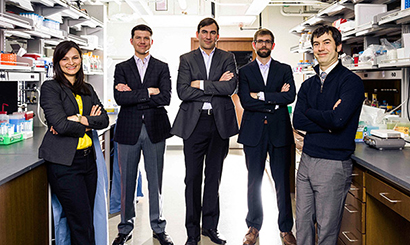News
Northwestern launches Center for Synthetic Biology
March 22, 2016
Scientists engineer living systems to tackle global problems
Northwestern University synthetic biology researchers already are breaking ground in critical areas such as public health, energy and the environment. Now, to help make Northwestern one of the country’s top destinations for research and education in the young field, the University has launched the Center for Synthetic Biology.
“This center will rapidly raise our leadership profile in the field,” said Milan Mrksich, director of the center. “It will create a community where the best faculty, students and postdoctoral fellows find an intellectual home with partners from diverse backgrounds, a suite of technologies that allow research to be performed at the highest level, and a vibrant program for visitors from both within and outside Northwestern. This will create an ecosystem for synthetic biology that is second to none.”
Synthetic biology uses tools and concepts from physics, engineering and computer science to build new biological systems. Much of this research focuses on reprogramming cells by changing their DNA to take on new specialized purposes, such as creating sustainable chemicals, next generation materials or targeted therapies.
The Center for Synthetic Biology is led by Mrksich, the Henry Wade Rogers Professor of biomedical engineering, chemistry and cell and molecular biology, and co-director Michael Jewett, associate professor of chemical and biological engineering.
“The center will focus on research that lies at the intersection of science and technology, creating opportunities for technology transfer, clinical translation and commercialization,” Jewett said. “Our educational priorities will help create a tightknit community that further enhances this field.”
The center’s advisory board includes three internationally renowned scientists and engineers: Frances Arnold, the Dick and Barbara Dickinson Professor of Chemical Engineering, Bioengineering, and Biochemistry at the California Institute of Technology; James J. Collins, the Termeer Professor of Bioengineering at the Massachusetts Institute of Technology; and Wendell Lim, professor of cellular and molecular pharmacology at the University of California at San Francisco.
“This new center will help us attract some of the best minds and researchers as we continue to grow in this field,” said Julio M. Ottino, dean of Northwestern’s McCormick School of Engineering. “With a strong core in chemical engineering and connections to many other disciplines, our faculty have already established themselves as an emerging area of strength.”
“Centers play an important catalytic role at Northwestern, providing an infrastructure for faculty to collaborate across disciplines,” said Jay Walsh, vice president for research at Northwestern. “Northwestern remains committed to investing in research that has far-reaching implications in fields like health care and sustainability. Our research in synthetic biology will continue to search for and develop new solutions to the world’s most pressing problems.”
In addition to center leadership, faculty members Neda Bagheri, Joshua Leonard and Keith Tyo have already put Northwestern on the map as a national leader in this growing area of study.
Tyo, for example, has received three Gates Foundation grants, one of which is a collaboration with Leonard to engineer yeast-based biosensors to serve as cost-effective, easily deployed diagnostics for patients in developing countries. An expert in computational biology, Bagheri develops algorithms that uncover the dynamic communication blueprints of cellular systems.
Jewett, who has been honored with the David and Lucile Packard Fellowship for Science and Engineering and the Camille Dreyfus Teacher-Scholar Award for his efforts in synthetic biology, has made powerful contributions to the field, including efforts to repurpose ribosomes for manufacturing novel materials and therapeutics.
Mrksich boosted the field by developing a technology that radically accelerates the measurement of biochemical reactions, increasing the production, purification and characterization of proteins at a 1,000-fold scale greater than what is now common.
Recognizing the importance of understanding the ethical implications of emerging technologies, the center also includes member Laurie Zoloth, professor of bioethics and medical humanities at Northwestern University Feinberg School of Medicine and professor of religious studies in the Weinberg College of Arts and Sciences.
Another sign of the growing interest in synthetic biology comes from undergraduate students. The International Genetically Engineered Machine competition, or iGEM, now attracts more than 200 teams of students worldwide, including a Northwestern team co-mentored by Leonard, Jewett and Tyo. Northwestern’s iGEM team received top honors in 2012 by developing an E. coli-based biosensor that could help detect the presence of a pathogen in hospital settings.
The center will continue to support the iGEM teams, providing a home for these motivated undergraduates and with consultation from leading faculty. Further, the center will have strong ties with INVO, Northwestern’s Innovations and New Ventures Office, as many of the projects will offer new opportunities for commercialization.
“We have grown in an organic, patchwork way,” Mrksich said. “Our students know each other, but they don’t recognize the entirety of the community. The center will solidify their experience, so we can all come together and attack the real challenges in the field.”
